Do Watermelon Cause Diarrhea | Reasons Watermelon Lovers Should Beware
Watermelon is vital for an optimal diet as it is high in minerals, vitamins, and antioxidants.
Yet, many people wonder "do watermelon cause diarrhea?," “why do I get diarrhea after eating watermelon?,” or “ can too much watermelon give you diarrhea?” when it comes to overeating this fruit.
In fact, overeating anything, including fruits, can have a number of negative consequences, not except diarrhea watermelon.
So, this article discusses whether watermelon causes diarrhea, negative effects of eating too much watermelon and explains some myths about watermelon's impact on your diet.

Why does watermelon cause diarrhea?
Does Watermelon Make You Have Diarrhea?
As delicious as they are, some people experience diarrhea after eating watermelon and wonder if watermelon gives me diarrhea.
Is watermelon bad for diarrhea? Can watermelon give you diarrhea? is watermelon good in diarrhea? Does melon cause diarrhea? Can eating watermelon cause diarrhea?
Does too much watermelon cause diarrhea? Can too much watermelon cause diarrhea?
The 3 main reasons why watermelon cause diarrhea are listed below.

Will watermelon give you diarrhea?
Fructose malabsorption
The first and most common cause of water melon in diarrhea is fructose malabsorption.
Fructose is known as a sugar that exists in numerous plants but in the highest concentrations in fruits.
Fructose malabsorption occurs when your intestines are unable to break down fructose effectively during digestion.
It is normally absorbed in the small intestine, but if it is not appropriately absorbed, it may travel to the large intestine and be fermented by bacteria, potentially causing cramps, bloating, and diarrhea.
This condition is a common symptom of larger conditions such as IBS, but it can also occur on its own.
According to Traditional Oven, there is approximately 6g of sugar in 100g of raw, natural watermelon, of which 3.36g is fructose.

Diarrhea after watermelon is a result of fructose malabsorption
Due to its fructose content, water is considered a high FODMAP food, which is a group of fermentable short-chain carbs that are either indigestible or slowly absorbed in the small intestine.
Lycopene
Can melon cause diarrhea? Yes, due to lycopene.
It is a carotenoid that provides fruits like watermelon their red color and according to the American Cancer Society, consuming more than 30 mg of lycopene per day.
However, it is also the reason watermelon give you diarrhea.
Watermelon contains approximately 9-13 mg of lycopene per 1.5 cups.
As stated by a June 2014 study published in the EXCLI Journal, red-fleshed watermelon has 40% more lycopene than tomatoes.
Noting that other fruits like pink grapefruit and tomatoes also contain it, the amount watermelon gives can put you over the unofficial 30 mg threshold.
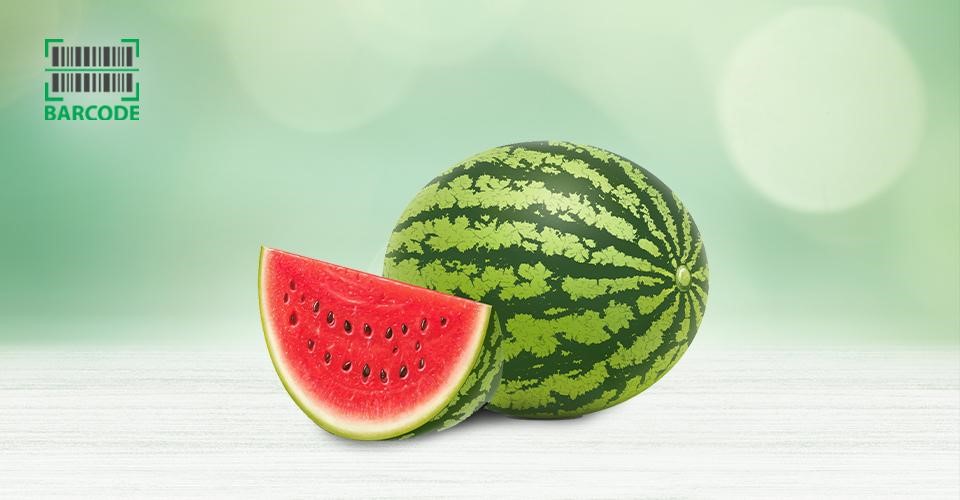
A large percentage of lycopene causes watermelon in diarrhea
Also read: 10 best recipes with Coca-Cola
High water content
Diarrhea from watermelon is also due to high water content of this fruit, which is the answer to the question “can watermelon juice cause diarrhea?” as well.
Watermelons contain approximately 92% water, which is quite high and is most likely why they have the word 'water' in their name.
In fact, this is not likely to lead to watermelon juice diarrhea, but foods with high water content may potentially encourage bowel movements and may tip the scales too far in that direction.
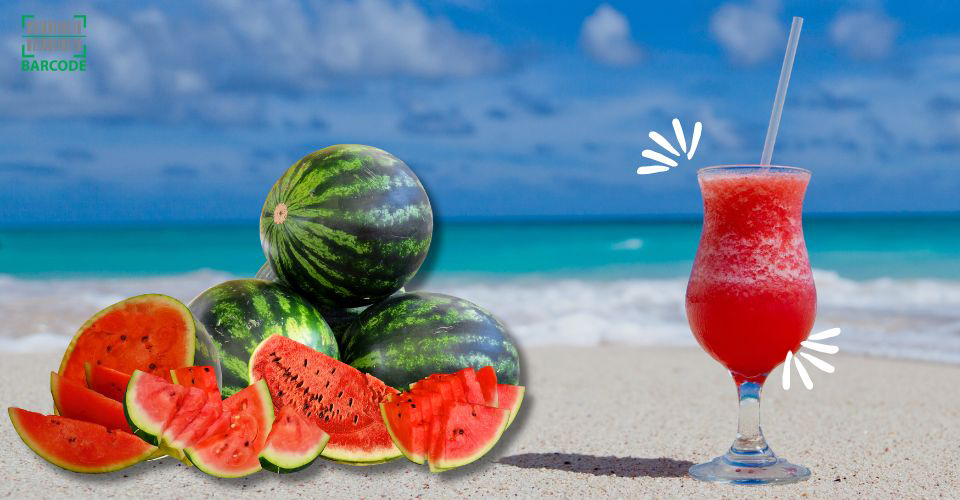
Watermelon is a high water content fruit
Despite the reasons watermelon can cause diarrhea, many watermelon lovers may still want to know can we eat watermelon in diarrhea or is watermelon good for diarrhea.
This issue will be covered later…
What Are Other Side Effects of Eating Too Much Watermelon?
Can watermelon cause diarrhea? Yes, watermelon gave me diarrhea.
Although it may not cause things like poison watermelon, watermelon in large quantities can still be harmful to your health.
Here are some of the disadvantages of watermelon in addition to watermelon diarrhea.
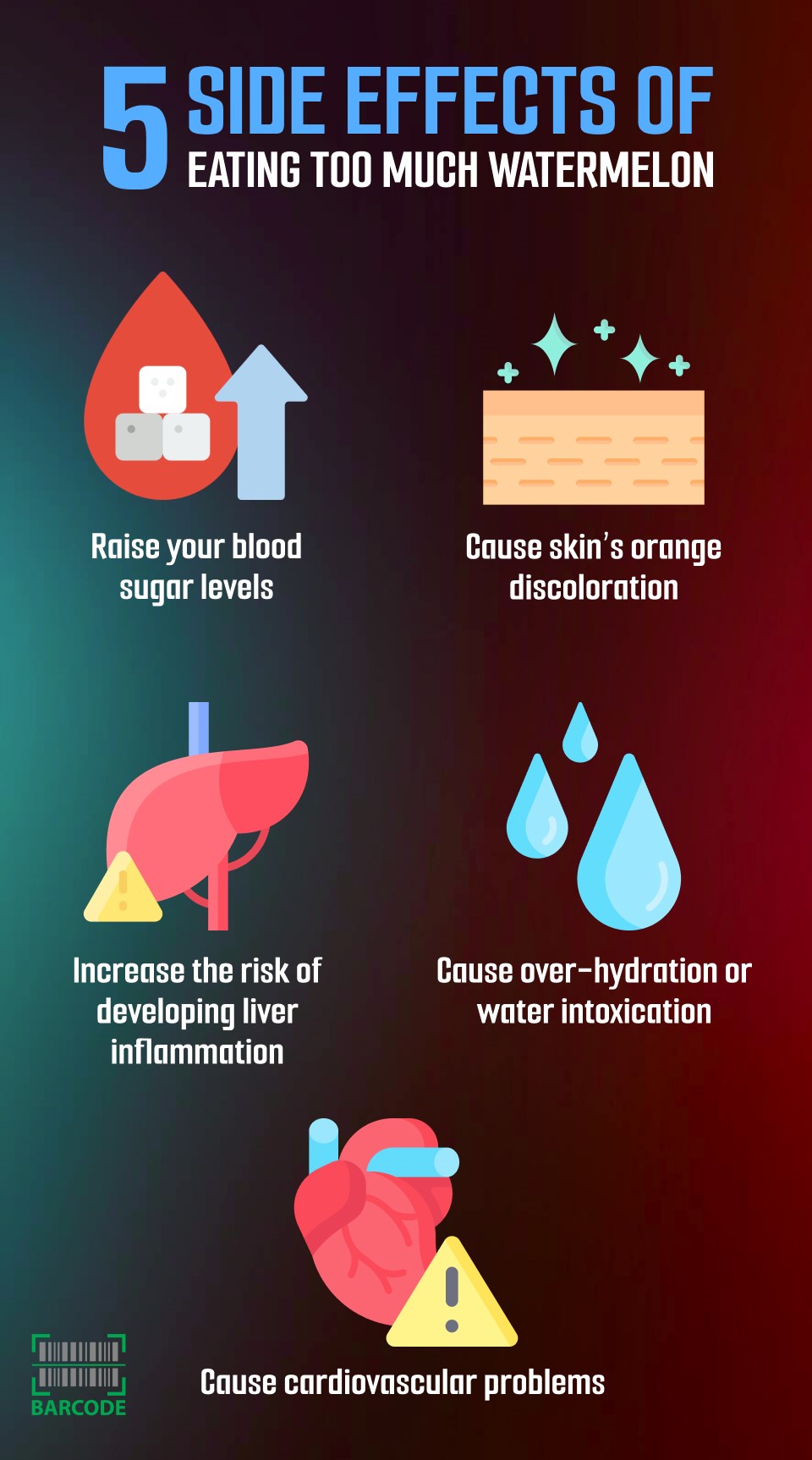
5 main disadvantages of overeating watermelons
Raise your blood sugar levels
Watermelon has a high glycemic index (GI) besides its high FODMAP content.
As a result, eating too much watermelon may cause your blood sugar levels to rise, which is especially important if you have diabetes.
High GI foods (GI levels greater than 70) are likely to spike blood sugar levels, whereas low GI foods (GI levels less than 55) make a steady rise.
The GI of watermelons ranges from 72-80, which is high.
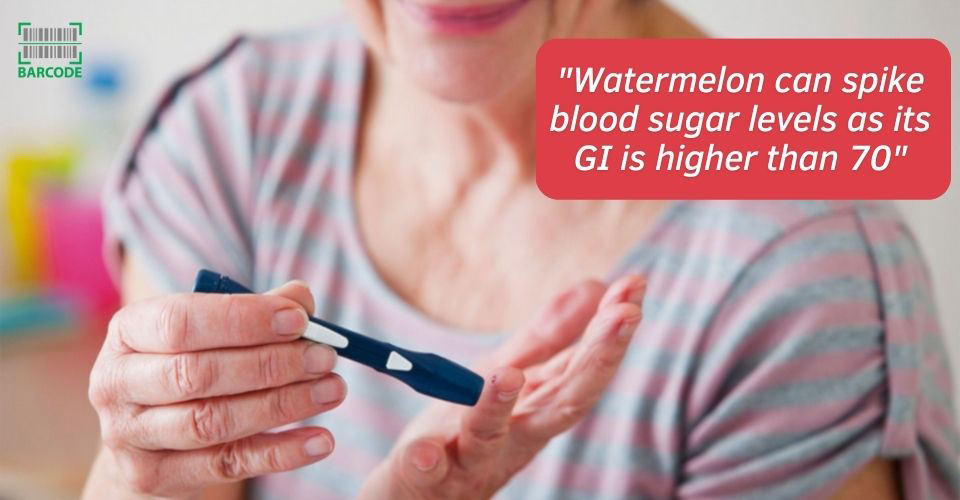
Watermelon is a high-GI food
Whereas the GI may reveal how your blood sugar reacts to a specific carbohydrate-containing food, the glycemic load (GL) takes into account the serving size, making it a more precise measure of a food's impact on your blood sugar levels.
Despite being a low GL food (a GL of 5-6 per cup (152 grams), eating too much watermelon will raise its GL, most likely resulting in a blood sugar spike.
Thus, monitoring your blood sugar is critical if you have diabetes; and many people choose to wear the best smart watch with blood sugar monitor.
Cause skin’s orange discoloration
Though rare, one study discovered that eating too much watermelon can be associated with lycopenemia, a yellow-orange skin discoloration that is a variant of carotenemia.

Watermelon can lead to skin’s orange discoloration
As previously stated, lycopene is an antioxidant as well as a pigment and is responsible for the distinctive red color of watermelons as well as other fruits and vegetables.
It may accumulate in the outer layers of your skin and change the pigmentation of your skin if excessively consumed.
Luckily, lycopenemia is a rare but completely reversible condition. Its skin-damaging effects can be totally reversed by limiting your intake of lycopene-rich foods such as watermelon.
Cause overhydration or water intoxication
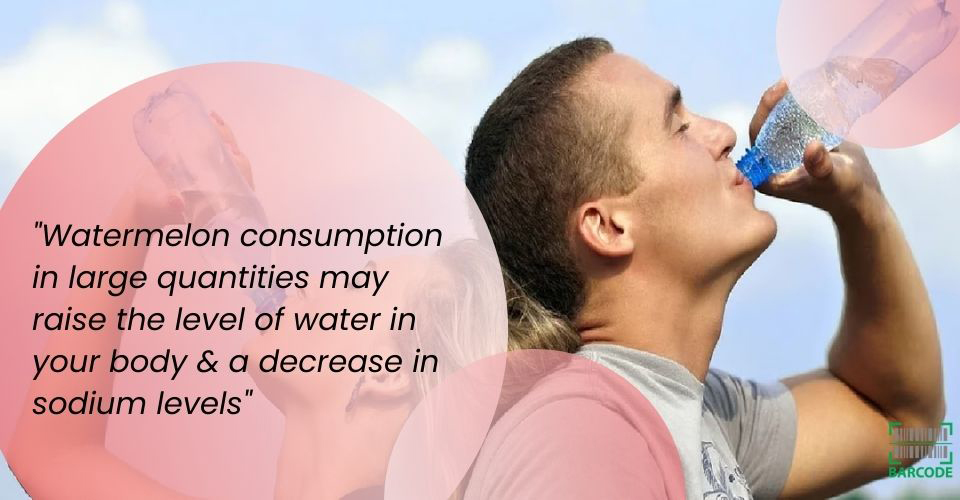
Over-consuming watermelon can cause overhydration
Water intoxication, also known as overhydration, is a condition in which the body has an excess of water, resulting in sodium loss.
Watermelon consumption in large quantities may raise the level of water in your body.
Unless the excess water is excreted, it can cause an increase in blood volume, resulting in exhaustion, swelling in the legs, weak kidneys, and other symptoms.
It may also cause a decrease in sodium levels in the body.
Cause cardiovascular problems
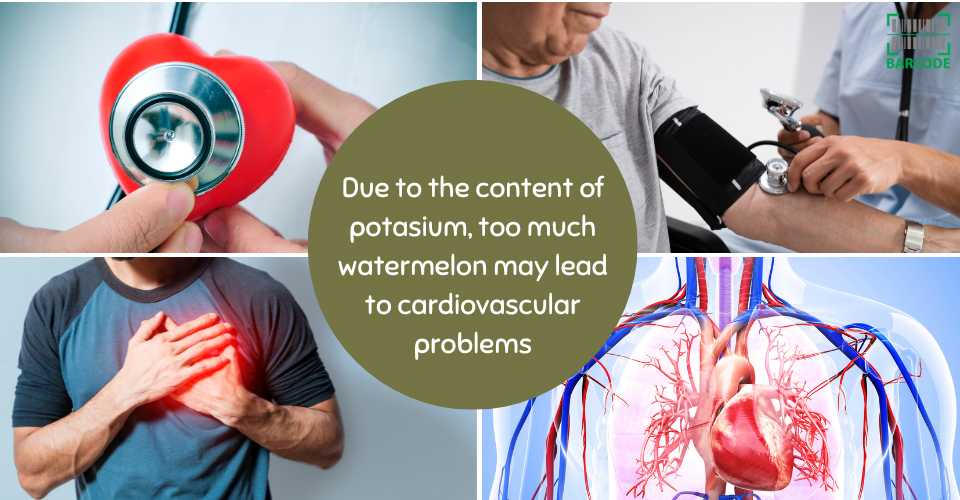
Too much watermelon can cause cardiovascular problems
Watermelon is a good source of potassium, which is an important nutrient that plays many roles in keeping the body healthy.
It assists in preserving electrolyte function, keeping the heart healthy, and strengthening your muscles and bones.
It tastes well when it goes with things like 750 ml Coke as well.
That being said, too much potassium can cause cardiovascular problems such as low pulse rate, irregular heartbeat, etc.
Do you know you can make a wonderful drink when mixing watermelon with Soda. Try to mix some great drinks below
Increase the risk of developing liver inflammation
Individuals who frequently consume alcohol should avoid eating large amounts of watermelon because the high level of lycopene may interact with alcohol, leading to liver inflammation.
Excessive oxidative stress can be harmful to the liver as well.
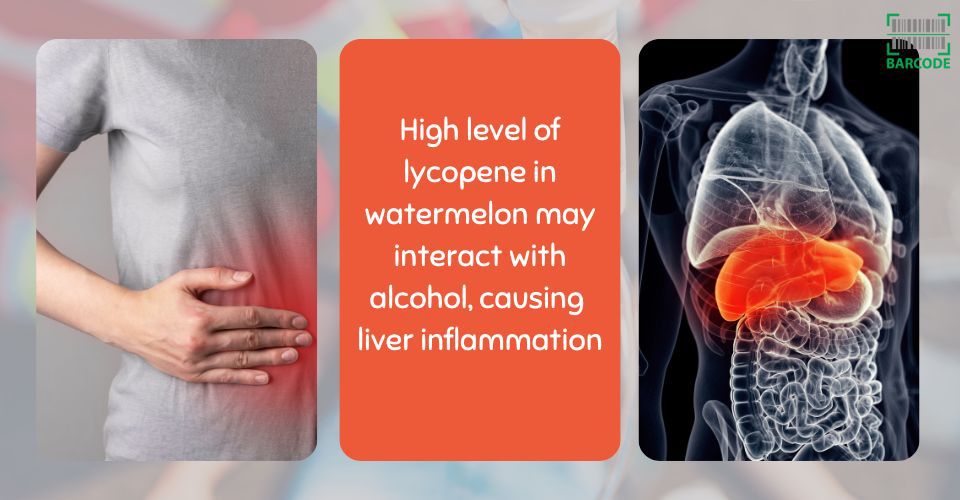
Eating watermelon too much can affect liver inflammation
How Much Watermelon Is Too Much?
Watermelon is a healthy and safe fruit, and nutritionists have not established an unsafe intake limit.
Despite that, if you want to keep your blood sugar levels low, you should limit your intake as you already know “is watermelon cause diarrhea?.”
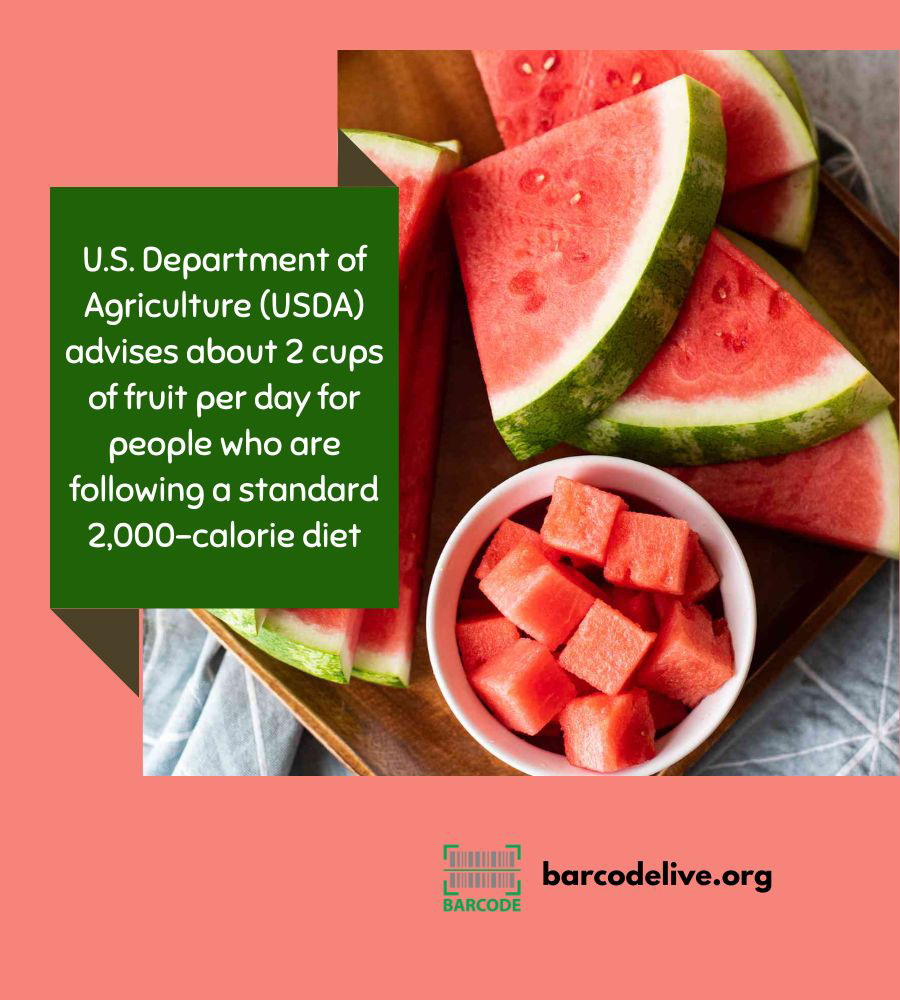
You had better avoid too much watermelon diarrhea
In terms of blood sugar levels, a 4-cup (608-gram) serving of watermelon has a high glycemic index and contains 46 grams of carbs, 36 of which are sugar.
This may result in an increase in your blood sugar levels.
In this case, the U.S. Department of Agriculture (USDA) advises about 2 cups of fruit per day for people who are following a standard 2,000-calorie diet.
It equates to about 300 grams of watermelon.
Foods to Eat to Manage Diarrhea
Numerous foods can help maintain the health of your digestive system and help with symptom management. Consider the following options:
-
Bananas: They can aid in firming stools, are high in potassium, and are simple to digest.
-
White rice or toast: When someone has diarrhea, these bland meals might help bind the stool and offer relief.
-
Boiled potatoes: They are a fantastic source of energy and are easy on the stomach.
-
Cooked carrots: They are readily digested and have little fiber.
-
Chicken or vegetable broth: These can aid in restoring electrolytes and fluids lost as a result of diarrhea.
Keep in mind that each person has a different digestive system and that some meals may either trigger or worsen diarrhea symptoms.
Therefore, it's wise to listen to your body and choose foods that you know it will accept.
You may also take supplements to support occasional diarrhea. Here are some of the best products with thousands of purchases and positive reviews from customers:
Despite the relationship between diarrhea and watermelon mentioned earlier, watermelon is good for diarrhea, to some extent.
In other words, watermelon for diarrhea is okay.
The fluids and electrolytes found in watermelon can assist in restoring those lost due to diarrhea.
Further, pectin is a component of watermelon, which is also a soluble fiber that can aid in stool firming.
Therefore, don’t worry about can we eat watermelon during diarrhea!
Yes, you can loose motion after eating watermelon.
Lycopene and sorbitol, two of the watery and fibrous qualities of watermelon's components, can exacerbate bloating, flatulence, and stool after eating watermelon.
Why does watermelon make me poop is also a popular question.
Besides watermelon causing diarrhea, “watermelon makes me poop” may be due to the high levels of fructose, fiber, sugar, and water in watermelons, which induce bowel movements.
Excessive consumption may even lead to further complications, thus avoiding eating too many watermelons to keep safe.
Whereas watermelons are an awesome summer fruit, consuming too many of them may cause your stool to turn red.
Watermelon in stool is caused by the body's inability to completely digest the compound lycopene, which grants watermelon its red color.
Can I eat watermelon during diarrhea? - Yes. However, you can still substitute watermelon during diarrhea, you had better eat foods high in potassium and sodium.
Avocados, apricots, oranges, canned tomatoes, bananas, pears, potatoes, sweet potatoes (especially baked), and tomato juice are all high in potassium.
Water and electrolytes are both abundant in watermelons.
So, eating watermelon in loose motion is a good idea and it helps prevent dehydration as well.
Despite that, avoid overeating it as water melon in loose motion can also happen, which is among negative effects watermelon.
Final Thoughts
Does watermelon give you diarrhea? Watermelon is a great source of dietary fiber as well as a good source of water. Even so, consuming it in large quantities may cause digestive problems such as yellow watermelon diarrhea because it is high in fructose, lycopene, and water content.
After reading our article titled “Do watermelon cause diarrhea?” and discover the relationship between watermelon and diarrhea, we hope you now have a better understanding of why does watermelon give me diarrhea and will avoid any negative effects from it.
Sources:
https://www.traditionaloven.com/foods/specific-nutrient/fruits-juice/watermelon-raw/fructose-fruit-sugar.html
https://www.ncbi.nlm.nih.gov/pmc/articles/PMC4464475/
https://pubmed.ncbi.nlm.nih.gov/17992183/
https://www.ncbi.nlm.nih.gov/pmc/articles/PMC5366046/
https://www.ncbi.nlm.nih.gov/pmc/articles/PMC6213615/
https://www.ncbi.nlm.nih.gov/pmc/articles/PMC5366046/
https://pubmed.ncbi.nlm.nih.gov/32584429/
https://www.dietaryguidelines.gov/sites/default/files/2021-03/Dietary_Guidelines_for_Americans-2020-2025.pdf
![BEST Vegan Sources of Iodine For Vegetarians [LIST]](https://barcodelive.org/filemanager/data-images/imgs/20230328/News_7%20Best%20Vegan%20Sources%20of%20Iodine%20For%20Vegetarians_1.jpg)



7 Comments
Anand Arora
Do you have some meal ideas for a person that says that vegan food causes him diarrhea?
Leave a Comment
Your email address will not be published. Required fields are marked *Kevin Bell
Then try spaghetti with beyond meat, refried bean and tofu/mock meat burritos, tofu stir fry/pad thai/fried rice, lentil soup, lentil “meat” loaf, vegan shepherds pie (lentils, mock meat, or walnuts), veggie sushi, diy sandwiches
Leave a Comment
Your email address will not be published. Required fields are marked *Edward
French fries, french fries with ketchup 8 times!!!!
Leave a Comment
Your email address will not be published. Required fields are marked *Preshita Sing
Thank you so much. You are always a great help!
Leave a Comment
Your email address will not be published. Required fields are marked *Barcodelive
Glad you found it helpful
Leave a Comment
Your email address will not be published. Required fields are marked *George Mitchell
I've been having diarrhea for at least 3 months and the colors seem to alter between dark brown slightly red, red, and yellow which i have mostly. This may be caused by the watermelon I've been eating every day. But if anyone knows, please tell me.
Leave a Comment
Your email address will not be published. Required fields are marked *Barcodelive
You need to go to the doctor ASAP
Leave a Comment
Your email address will not be published. Required fields are marked *Leave a Comment
Your email address will not be published. Required fields are marked *